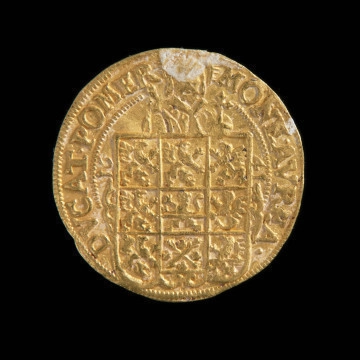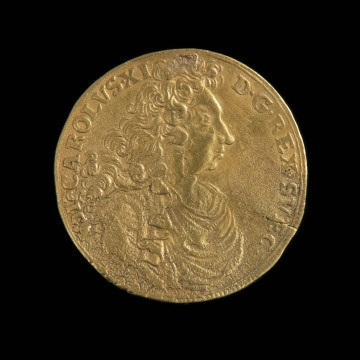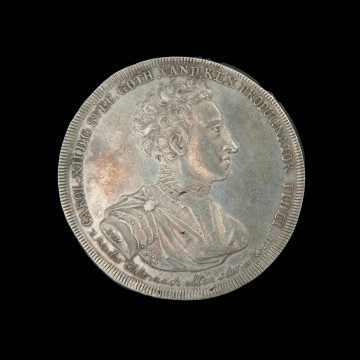
Ducat
1641
National Museum in Szczecin
Part of the collection: Pomeranian coins
After the heirless death of Duke Bogislaw XIV in 1637, West Pomerania was divided between Sweden and Brandenburg. In 1640, the Swedish rulers in the incorporated part of Pomerania, mostly in the former Duchy of Wallachia, began to mint thalers and half-thalers in Szczecin according to the existing system. The Swedes were not interested in tidying up and unifying the Pomeranian minting industry (different minting rates applied in the former duchies), but in gaining another source of revenue. The mint in Szczecin, during the reign of Queen Christina (1640-1654), worked intermittently and production was rather low. Ulryk Bütkow, who held this office in Koszalin in 1633-1637, was sworn in as a mint master in 1640. His initials can be found on the ducats of the Duke Bogislaw XIV, and later also on the Pomeranian orts, thalers and ducats of the King Charles X Gustav (1654-1660). Due to a lack of documents, the Pomeranian minting of Queen Christina is best described by coins. At that time, thalers, half-thalers and ducats were most frequently minted according to the traditional iconographic scheme with the image of the ruler on the obverse and the great coat of arms of West Pomerania on the reverse. The Queen's royal titles include hereditary reigns with the Swedes, Goths and Vandals, while the inscription on the reverse shows the Pomeranian system. Beautiful busts or half-figures of Christina appeared on all the denominations, except for the low-value wittens. The stamps of the thaler in question show a crowned bust of the Queen facing 3/4 to the left and the great coat of arms of the House of Griffin fully framed. On the long, elaborately arranged hair of the ruler there is a small crown, placed on the back of her head, apparently regarded as an ornament rather than the most recognisable insignia of power. The costume and jewellery have been rendered with attention to detail, but without artistic flair. On the reverse, a blank field appeared in the heart field of the ten-field shield. In the times of the last Griffins, this field was filled with the emblem of the bishopric of Kamień Pomorski, whose lands belonged to Brandenburg. It might be a representation of the Swedish rulers’ claim, especially in the period when the borders of the countries were being negotiated after the Thirty Years' War. Thalers with this content were still minted in 1644 and 1647, and the last ones appeared just before the Queen's abdication in 1654.
Genowefa Horoszko
Other names
Taler
Author / creator
Dimensions
cały obiekt: height: 2.6 mm, diameter: 42.8 mm
Object type
coin
Technique
minting
Material
silver
Creation time / dating
Creation / finding place
Owner
National Museum in Szczecin
Identification number
Location / status

Bütkow, Ulryk
1641
National Museum in Szczecin

Arenburg, Julius Christian
1697
National Museum in Szczecin

Memmies, Johann
1709
National Museum in Szczecin
DISCOVER this TOPIC
Castle Museum in Łańcut
DISCOVER this PATH
Educational path
0/500

We use cookies to make it easier for you to use our website and for statistical purposes. You can manage cookies by changing the settings of your web browser. More information in the Privacy Policy.
We use cookies to make it easier for you to use our website and for statistical purposes. You can manage cookies by changing the settings of your web browser. More information in the Privacy Policy.
Manage cookies:
This type of cookies is necessary for the website to function. You can change your browser settings to block them, but then the website will not work properly.
WYMAGANE
They are used to measure user engagement and generate statistics about the website to better understand how it is used. If you block this type of cookies, we will not be able to collect information about the use of the website and we will not be able to monitor its performance.